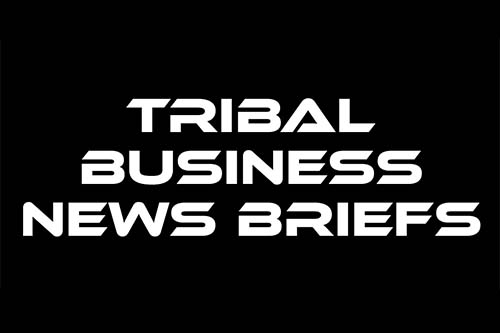Here is a round up of business news from around Indian Country.

Tourism
• The Office of Indian Economic Development within the Bureau of Indian Affairs at the U.S. Department of the Interior is seeking applications from American Indian and Alaska Native tribes and tribal organizations for its 2021 fiscal year Tribal Tourism Grant Program. The competitive grant program will provide grant funding to support tribal tourism feasibility studies as well as to develop tribal tourism business plans. The office also will consider proposals to help tribal tourism businesses recover and adapt to changes stemming from the COVID-19 pandemic. “Before COVID-19, Indian Country’s tourism industry brought in millions of dollars to Tribal, local and state economies. Since the pandemic’s start last year, however, the overall U.S. tourism industry has been one of the hardest hit economic sectors, and Tribal tourism businesses even harder,” Principal Deputy Assistant Secretary – Indian Affairs Bryan Newland said in a statement. The OIED expects to issue 20 to 35 grants ranging from $25,000 to $150,000. The deadline for applications is Aug. 13. For more information, visit this link.
Energy
• Two tribal solar projects are moving forward in Nevada, with the U.S. Department of the Interior’s Bureau of Land Management announcing July 16 that it had granted final approval to the Southern Bighorn Solar Project on Moapa Paiute lands. Interior at the same time announced the beginning of construction of the Arrow Canyon Solar Project, also on Moapa lands. The department said that the two projects would “support over 800 jobs and generate enough electricity to power up to 192,000 homes.”
“The time for a clean energy future is now — and tribal communities have a significant role to play in the administration’s ambitious goals,” Interior Secretary Deb Haaland said in a statement. “These solar projects will support local tribal economies while adding to the nation’s clean energy supply.”
Finance
• Tribally owned insurance firm Amerind promoted Robert Dahl to Chief Operating Officer. Dahl has been at Amerind since 2015 and served as the executive supervisor of the firm’s Tribal Workers’ Compensation program, Business Development, Marketing & Event Planning and Customer Experience teams, and the Amerind Benefits Agency. In the new role, Dahl will oversee insurance operations teams and work with the executive team and board of directors. Dahl has more than 35 years of experience in the insurance industry and has worked with Native American tribes for more than 30 years, according to a statement.
Government
• Kathryn Isom-Clause (Taos Pueblo) was named Deputy Assistant Secretary for Indian Affairs within the Department of the Interior. Most recently, Isom-Clause served as vice chair of the National Indian Gaming Commission. Isom-Clause formerly was a senior counselor to the Assistant Secretary of Indian Affairs, chaired interagency working groups on sacred sites and homelessness and advised on gaming matters and tribal homelands restoration. Prior to working in the government, Isom-Clause represented tribal clients on federal Indian law and policy matters. Isom-Clause has a bachelor’s degree from Wellesley College and a law degree from Columbia Law School.
Hospitality
• The Rincon Band of Luiseño Indians-owned Harrah’s Resort Southern California is partnering with celebrity chef Gordon Ramsay to open a Hell’s Kitchen concept restaurant at the Funner, Calif. property in spring 2022. The 332-seat location will be the third and largest Hell’s Kitchen to open in the U.S. Construction is expected to begin this summer, according to a statement. “It’s an exciting moment to be able to bring such a well-known, high-energy concept to the resort and it’s perfectly in line with our continued commitment to keeping our guests excited, energized and full of options, while visiting us here at our resort,” Chairman Bo Mazzetti of the Rincon Tribe said in a statement. Harrah’s Resort Southern California includes 1,087 rooms, a 11,000-square-foot spa and a tribally owned brewery, along with a gaming floor with 1,600 slot machines and 50 table games.
Gaming
• The Nottawaseppi Huron Band of Potawatomi Indians’ FireKeepers Casino and its partner NYX Digital have been approved by the state of Michigan to launch online sports betting and igaming, according to regional business publication MiBiz. FireKeepers Casino is now the 13th operator to be licensed for online gaming in the state. FireKeepers worked with NYX Digital to develop a self-branded platform. The Pokagon Band of Potawatomi’s Four Winds Casino and Saginaw Chippewa Indian Tribe’s Soaring Eagle Casino are also developing self-branded platforms. “We are thrilled to be able to provide another level of entertainment to the people of Michigan,” FireKeepers CEO Kathy George said in a statement. “Guests can now enjoy the FireKeepers experience from the comfort of their own homes, or wherever they are within the state of Michigan.”
• The Tribal Council of the Eastern Band of Cherokee Indians is moving forward with a $275 million plan to expand the Murphy, N.C.-based Valley River Casino, according to a report in Smoky Mountain News. The report noted that details of the expansion remain mostly undisclosed, but will include a new hotel tower, restaurant, lobby and cafe, spa and an expanded gaming floor. The tribe is working with Boston, Mass.-based JCJ Architecture Inc. to design the project, which it expects to finance via debt.
Education
• The Native American Heritage Fund, created in 2016 as part of an amendment to the gaming compact between the Nottawaseppi Huron Band of the Potawatomi (NHBP) and the state of Michigan, selected 11 projects in the state to receive $480,000 in grant funding. The largest awards went to Okemos Public Schools ($213,664) to rebrand the current “Chiefs” mascot to a new mascot that is culturally responsive and to Michigan College Access Network (MCAN) along with the Saginaw Chippewa Tribal College ($60,000) to increase college completion at tribal colleges through the use of coaches over the next three years.
